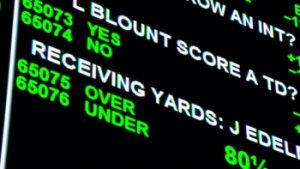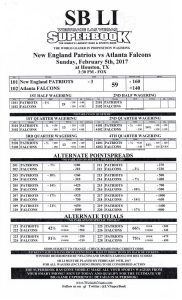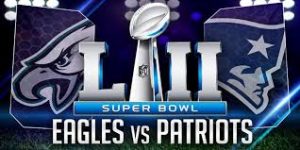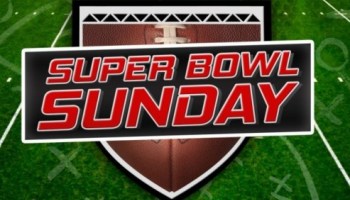Super Bowl Proposition Popularity is Big Business for Sports books
The Super Bowl, the SuperProp Guru & Brady’s Sixth Ring
Atlanta had taken command a year ago in Super Bowl LI. On a couch at a friend’s Super Bash in his Spanish Trail casa, the Stratosphere on the strip in Las Vegas dominating the backyard view, I turned to him and inquired about odds on New England to win outright. He tapped a casino app on his smart phone.
Sixteen-to-one, he said. We pondered it for several seconds. Lay 10 bucks, to get back $170? A hundred to return $1,700? Little risk, massive reward, the game’s best quarterback—Tom Brady—with yet one more point, or several, to prove.
 Neither of us bit. But as Brady mounted that comeback, erasing a 25-point deficit to win in overtime, we both shook our heads. Super Bowl wagering intensified last year as those apps and offshore opportunities matured, offering manifold options for punters.
Neither of us bit. But as Brady mounted that comeback, erasing a 25-point deficit to win in overtime, we both shook our heads. Super Bowl wagering intensified last year as those apps and offshore opportunities matured, offering manifold options for punters.
Art Manteris, Station Casinos vice president of race and sport, said the following day that those real-time options “really came of age” during that game. The popularity of proposition wagers, which comprised more than half of the bets made at Battle Born books, continues to grow, too. A monster, according to Wynn Las Vegas sports book director Johnny Avello.
That a record $138.48 million—up from the previous high haul of $132.54 million, in 2016—crossed hands from patrons to casino employees in ’17 did not surprise those in the business, due to those apps and props. Jay Kornegay, the props guru who runs the Westgate’s incomparable SuperBook, expects another record to be set for Super Bowl LII, between New England and Philadelphia, at U.S. Bank Stadium in Minneapolis, MN on Sunday, Feb. 4.
 Kornegay has established the SuperBook as the destination shop in Vegas. Its alluring redesign is immaculate and impressive. Its Super Bowl propositions, more than 400 on 16 pages, is coveted by anyone looking to lay a fin or two on the game. He posted the odds on his big board, to the right of a massive overhead curved wall of screens, early Thursday night; the physical “book” of props would be available to the public late Friday afternoon.
Kornegay has established the SuperBook as the destination shop in Vegas. Its alluring redesign is immaculate and impressive. Its Super Bowl propositions, more than 400 on 16 pages, is coveted by anyone looking to lay a fin or two on the game. He posted the odds on his big board, to the right of a massive overhead curved wall of screens, early Thursday night; the physical “book” of props would be available to the public late Friday afternoon.
“We try to be as creative as we can,” he says. “We dream up endless ones, within the confines of regulations; they must occur on the field of play.” He laughs. Patrons always make suggestions, and one requested a prop on a player wearing non-matching cleats. Kornegay clarified, to the customer, that Nevada books do not deal in such non-game folly, due to the human element, someone spreading the word, a cousin of a player’s best friend, say, giving such a scoop to his Vegas-resident brother.
Props were birthed in 1986, when Caesars and the MGM proposed 20-1 odds on William “The Refrigerator” Perry scoring a touchdown for Chicago in Super Bowl XX. By kickoff, it had been heavily wagered down to 2-1. Of course, the Fridge scored. MGM lost about fifty grand, Caesars more than twice that amount, likely much more.
In 1989, Kornegay, a Colorado native, opened the Imperial Palace sports book in Las Vegas. He tied Super Bowl props to other sporting events and athletes, in hopes of drawing more business to big games that were steadily one-sided, and boring. When other books were offering 40 props, Kornegay listed 80; others went to 100, he countered with 200.
Kornegay moved to the Hilton, the current Westgate, in 2004, and he’s continued to set the SuperProp bar. A year ago, he told the Washington Post that he never thought it would get to this level. Friday, he said, unlike offshore sites, Nevada books must conform to certain principles, which prohibit setting odds on Gatorade color, anthem length and, well, mismatched cleats, stuff that’s outside the lines.
 During their nearly 100 hours of deliberations, he and his team did try to finagle something based on the officials, but it just didn’t work. He was pleased to post a dozen options related to the city’s two new professional outfits, the Vegas Golden Knights of the NHL and the minor-league soccer Las Vegas Lights FC.
During their nearly 100 hours of deliberations, he and his team did try to finagle something based on the officials, but it just didn’t work. He was pleased to post a dozen options related to the city’s two new professional outfits, the Vegas Golden Knights of the NHL and the minor-league soccer Las Vegas Lights FC.
Most professionals, however, focus directly on the football game, he says. The sharpest of the sharps will shop diligently to nab a plus price on both sides of the same offering, to guarantee making money. They also scavenge for optimal “middles,” betting, at one book, that Tom Brady will pass for more than 276 yards, for example, and, at another, less than 290.
A year ago, a tsunami nearly swamped those operations. Kornegay has long feared a safety, successful 2-point conversion and overtime in the same Super Bowl. Years ago, he told me—kiddingly, I think—that such a hat trick might force his business to hang a CLOSED sign the next Monday. The 2017 affair included the first Super Bowl OT (which opened at plus-700, for Yes, at the Westgate) and a 2-point make (plus-270 for Yes). A safety (at plus-600 for Yes) did not occur.
In recent games, the safety has zapped Vegas. In 2012, Brady, from his own end zone, threw a pass out of bounds and was flagged for intentional grounding, an automatic safety. Those who had wagered on the first score of the game being a safety cashed at 100-1 odds. The following year, Baltimore, protecting a 5-point lead, took an intentional safety, producing another super winner for punters who put money on any safety or a safety as the final score.
And in ’14, the first snap of the game sailed past Peyton Manning and into the end zone, where Denver fell on it; the books took an uppercut on another first-score safety.
Soon, perhaps, the sports books will offer Yes or No odds on the trifecta of a safety/overtime/2-pointer all happening in the same game. That will give the shop, as if it needed one, one more revenue avenue, an industry hedge against two of them hitting. (Had that prop been offered for every Super Bowl, the books would be 51-0, so … Jay, when you add that next year, do I get a standard 10-percent finder’s fee?)
Do not cry for Nevada, though. Its Gaming Control Board started tracking the Super Bowl dollar figures in 1991, and the casinos have come out ahead in 25 of 27 games. A year ago, the shops netted $10.93 million on that record $138.48-million handle. Since ’91, the house has made $173.6 million on that singular game.
At the sports books, on an App and in the palm of your hand, prop betting on the Super Bowl is indeed widely popular and profitable.
Rob Miech contributed to this article. Article posted at osga.com.
